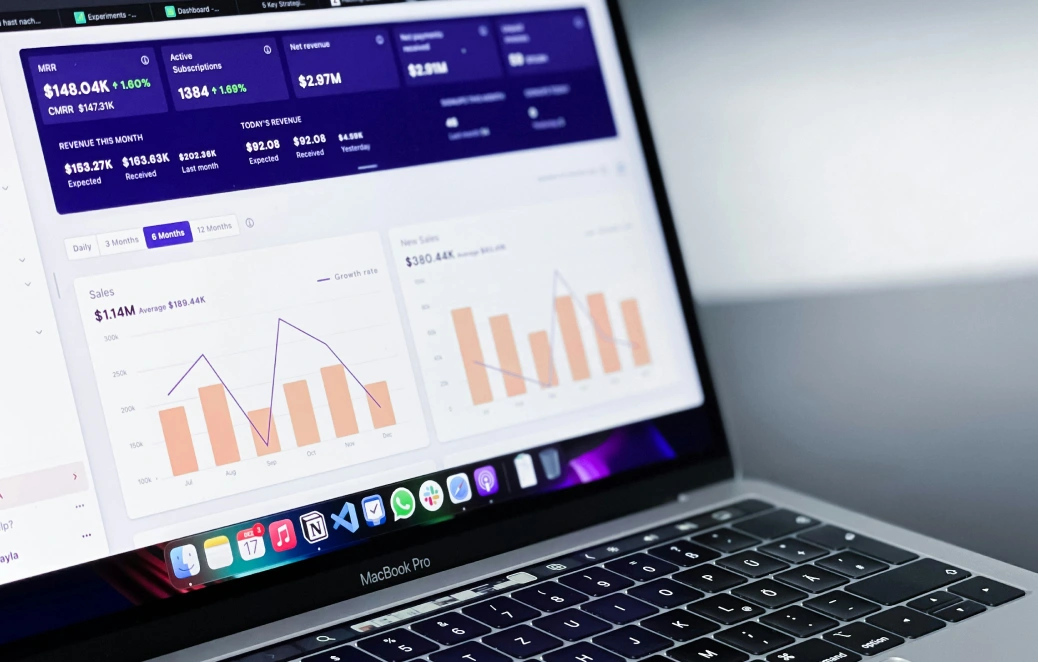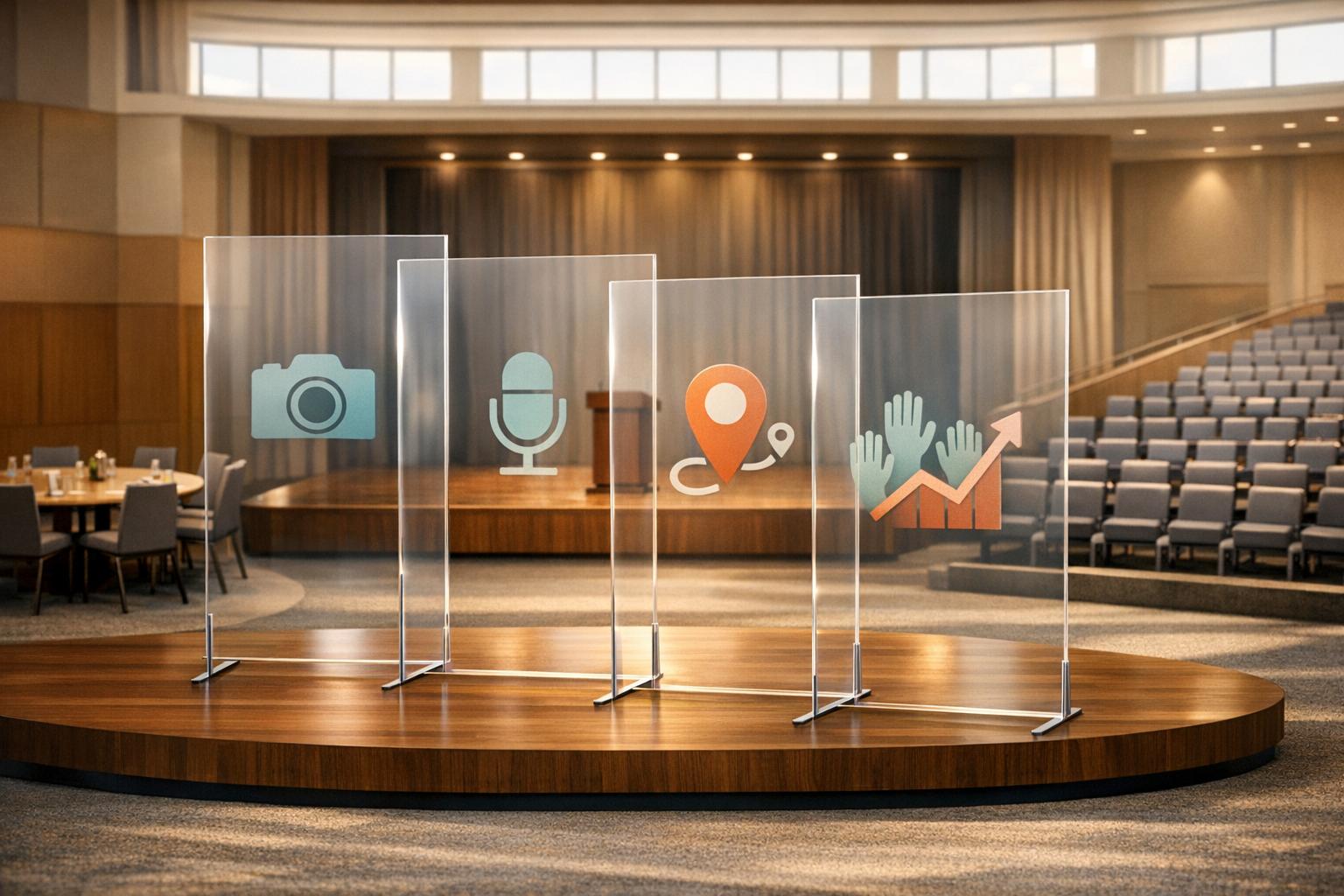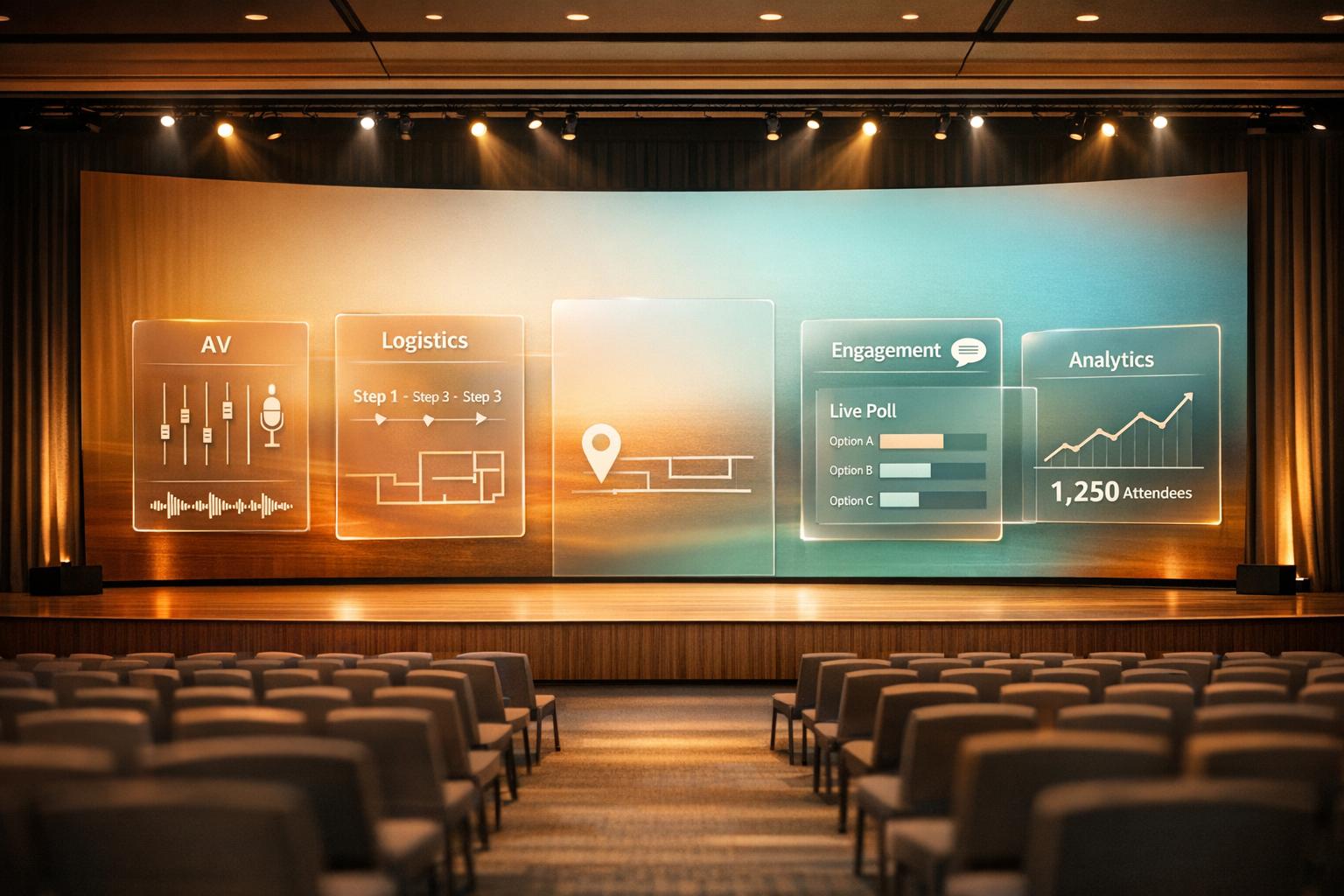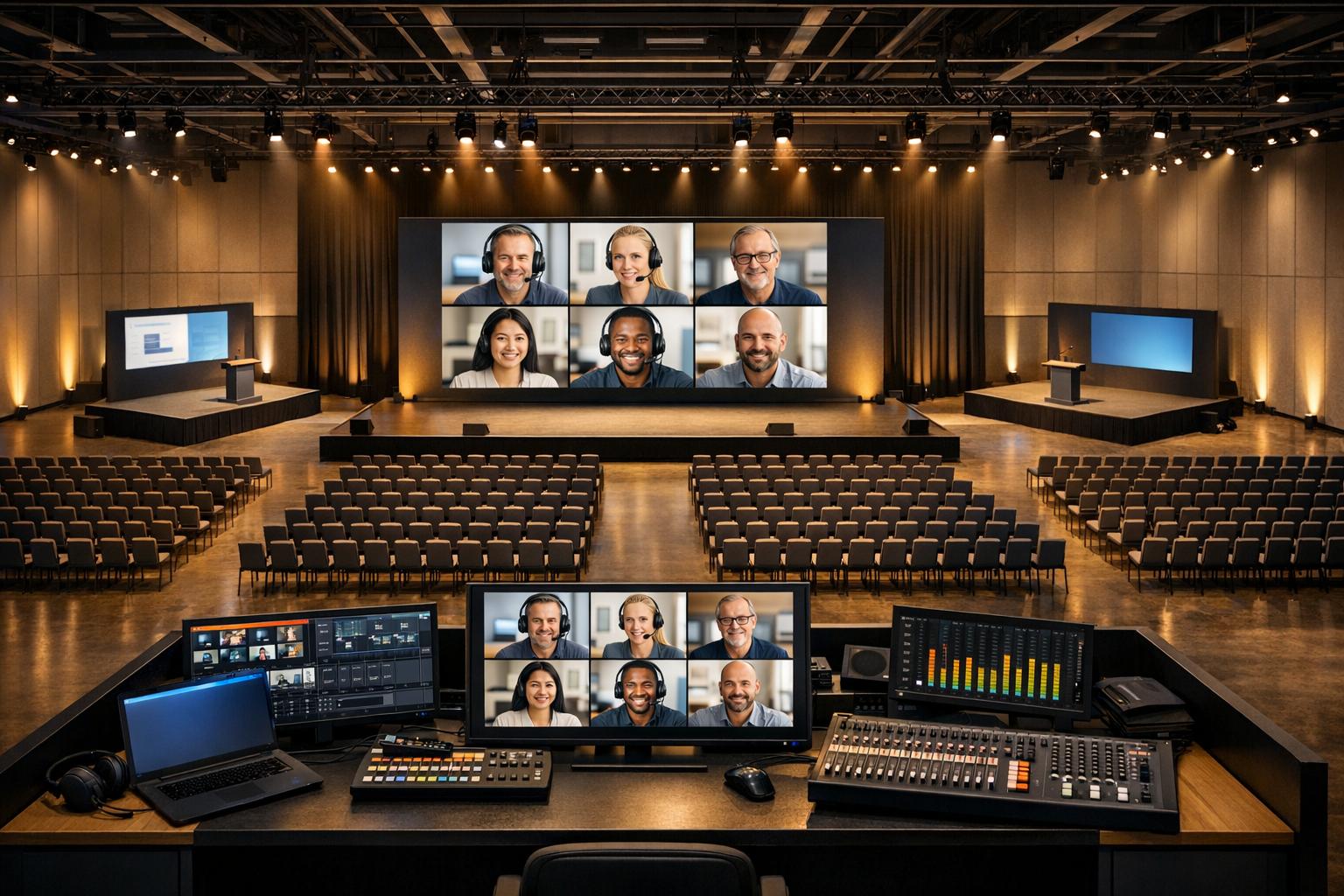Ultimate Guide To Planning Your Corporate Event With Professional Production Support

Chief Executive Officer
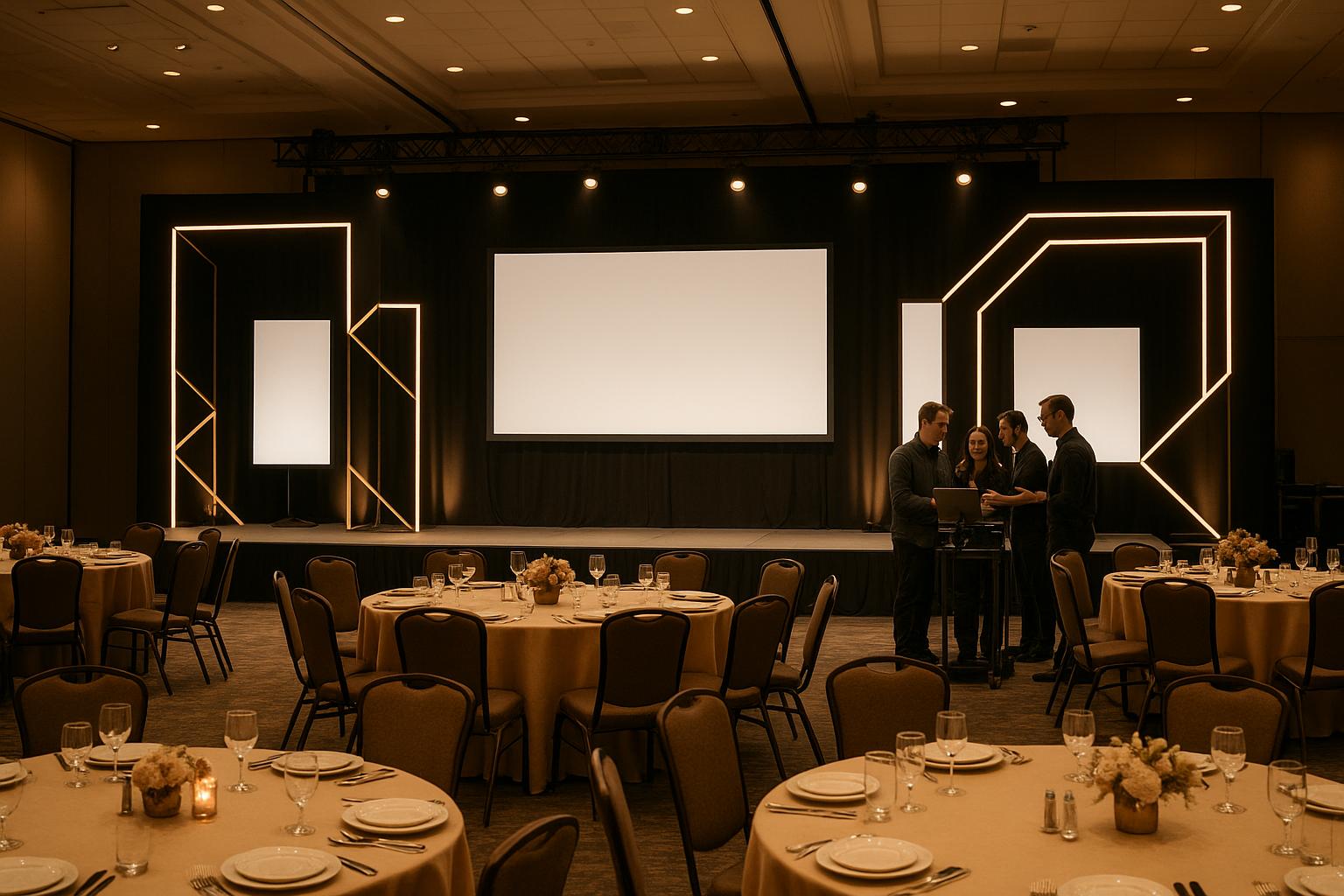
Planning a corporate event can be overwhelming, but professional production support transforms complex tasks into a smooth, effective process. Here's why it matters:
- Avoid technical issues: Experts handle audio, visuals, and staging to prevent disruptions.
- Save time and reduce stress: Production teams manage logistics, vendor coordination, and execution.
- Align with business goals: They create experiences that reflect your objectives and brand identity.
- Boost ROI: Their expertise avoids costly mistakes and optimizes resources.
Key Steps for Success:
- Set clear goals: Define measurable objectives like lead generation or attendee satisfaction.
- Choose the right format: In-person, virtual, or hybrid - each serves different purposes.
- Plan budget and timeline: Allocate resources wisely and set milestones.
- Collaborate with professionals: Work with experienced teams for seamless execution.
- Analyze results: Use metrics and feedback to evaluate success and improve future events.
Professional production support ensures your corporate event runs smoothly, aligns with your goals, and leaves a lasting impression on attendees. Let the experts handle the details while you focus on your business.
The Benefits of Bundling Event Planning and Event Production
Setting Your Event Goals and Vision
Before diving into logistics, take a moment to define your event’s purpose. Clear goals are the backbone of every decision you’ll make - whether it’s choosing a venue or crafting engaging content. Without a solid foundation of objectives, even the most impressive event can miss the mark in delivering real business value.
The best corporate events don’t just happen; they’re designed with goals that tie directly to broader business strategies. When aligned properly, your event becomes a tool to advance key objectives, rather than a costly endeavor with no measurable impact.
Creating Clear Goals and Metrics
Start by setting SMART goals - Specific, Measurable, Achievable, Relevant, Time-bound. Instead of vague aims like "boost brand awareness", aim for precise targets, such as generating 150 qualified leads in 30 days or achieving a 90% attendee satisfaction rate.
Knowing what success looks like for your event is essential. For example, a product launch might focus on securing media coverage in five industry outlets and generating $500,000 in pre-orders. An employee recognition event, on the other hand, might aim for 95% attendance from eligible staff and a 20% increase in employee engagement scores.
Consider this: 60% of executives see events as critical marketing channels, and 52% of CEOs report that events deliver better ROI than any other channel. These numbers highlight the importance of setting the right goals from the outset.
Your metrics should reflect both immediate and long-term outcomes. Immediate indicators could include attendance, social media activity, or leads generated. Long-term metrics might track deal closures, shifts in brand perception, or employee retention improvements following the event.
Matching Event Format to Your Goals
The format of your event - whether in-person, virtual, or hybrid - plays a huge role in achieving your SMART goals. Each format has strengths that align with different objectives, so choosing the right one is key to maximizing your event’s impact.
- In-person events are perfect for building strong relationships and creating memorable experiences. They’re ideal for objectives like networking, hands-on product demos, or fostering team cohesion. Face-to-face interactions build trust and emotional connections that are hard to replicate online.
- Virtual events excel at reaching large, geographically diverse audiences without the expense of travel. They’re great for delivering educational content, showcasing thought leadership, and boosting attendance. Plus, they offer robust analytics to measure success.
- Hybrid events combine the best of both worlds but require careful planning to ensure neither audience feels overlooked. These work well when you need in-person interaction for a core group while extending your reach to a wider online audience.
Your audience’s preferences should guide your choice. For instance, C-suite executives may prefer intimate, in-person settings for high-level discussions, while technical professionals might favor virtual formats that deliver detailed content without requiring travel.
Improving Event Vision with Expert Support
Once your goals are set, collaborating with professional production teams can elevate your event to the next level. While you focus on defining objectives, these experts specialize in turning those goals into engaging, impactful experiences.
Production professionals bring a strategic perspective that goes far beyond the technical side of things. They ensure every element - from stage design to audiovisuals - aligns with your key messages. With their industry expertise, they often uncover creative opportunities that internal teams might overlook.
For example, they might suggest adding interactive elements to a product launch, transforming a basic presentation into an immersive experience that keeps your audience engaged. They understand how to use lighting, sound, and staging to evoke the emotions that support your objectives.
Beyond execution, production teams ensure your event stays visually consistent with your branding, reinforcing recognition and professionalism. Their insights on content formats, engagement strategies, and technology solutions can help you create a more impactful event while staying within your budget and timeline.
With your goals and vision in place, the next step is planning your budget and timeline to ensure everything runs smoothly.
Budget Planning and Timeline Management
Budget planning and timeline management are essential for turning your event vision into reality. A well-thought-out budget paired with a detailed timeline ensures your team and production partners have the resources and time needed to deliver exceptional results.
This process isn’t just about keeping costs in check - it’s about making every dollar count. Careful planning ensures your event meets its goals while staying within financial boundaries, building on the foundation of your event objectives.
Building a Complete Budget
Corporate event budgets typically break down into several key categories, including:
- Venue Expenses
- Catering and Hospitality
- Audiovisual and Production Support
- Marketing and Communications
- Speaker Fees and Travel
- Miscellaneous Costs (like insurance, permits, and contingency funds)
The allocation for each category depends on the event's size, type, and goals. For smaller events, focus on essentials such as dependable audiovisual support and staging. Larger events may require more investment in custom production elements, advanced lighting, or live streaming capabilities.
It’s always smart to include a contingency fund to handle unexpected costs, like last-minute changes or unforeseen technical needs. This helps you stay prepared for surprises and minimizes financial risks. Also, keep full-cycle costs in mind to ensure a strong return on investment (ROI).
Creating a Planning Timeline
Organizing a successful corporate event often takes months of preparation. Start by working backward from the event date, setting milestones for key tasks like finalizing the budget, securing the venue, and engaging production partners. Be sure to include time buffers to account for delays.
Key areas to address in your timeline include coordinating speaker logistics, conducting technical rehearsals, and confirming registration and catering details. Regular reviews of content, technical setups, and vendor arrangements help fine-tune everything before the big day. This level of preparation reduces last-minute stress and ensures smooth execution. A clear timeline not only keeps you on track but also sets your production partners up for success.
Getting Better ROI with Production Support
Partnering with professional production teams adds value far beyond their fees. Their expertise prevents costly mistakes, streamlines vendor negotiations, and saves you planning time - all of which contribute to a stronger ROI.
Production professionals often have established relationships with suppliers, allowing them to secure cost-effective solutions and simplify procurement. Their technical knowledge also helps avoid potential issues before they arise.
Additionally, capturing high-quality content during the event can extend its value long after the day is over. This material can be used for marketing, training, or future promotions. With a solid budget and timeline in place, working with experienced production teams can bring your event vision to life while delivering measurable results. These efficiencies set the stage for smooth collaboration and a successful event.
Working with Professional Production Teams
Once your budget and timeline are in place, it's time to bring in the right production team. These professionals are the backbone of any successful corporate event, turning your vision into reality. While you focus on your attendees and business goals, the production team handles the technical and creative details, ensuring everything runs smoothly.
Key Roles in Event Production
A well-rounded production team is made up of experts, each playing a crucial role in bringing your event to life. Knowing who does what helps you communicate effectively and ensures no detail is overlooked.
- The event producer is the main coordinator, keeping all production elements on track and aligned with your goals. They work closely with your internal team to make sure the event reflects your brand and objectives.
- Audiovisual technicians handle the technical aspects, like sound systems, lighting, and video production. They ensure speakers are heard clearly, visuals are displayed correctly, and the ambiance fits the mood you want to create. Their expertise is especially critical for hybrid events or complex setups.
- Creative directors focus on the look and feel of your event, designing staging, managing scenic elements, and ensuring your brand is consistently represented throughout. For high-profile events like product launches or award ceremonies, they add that extra wow factor.
- Technical directors are the behind-the-scenes problem-solvers during the event. They manage equipment changes, troubleshoot issues on the spot, and keep everything running on schedule.
- Production assistants support the team by coordinating equipment, managing vendors, and ensuring everyone stays on the same page.
Selecting the Right Production Partner
Choosing the right production company can make or break your event. Here are some key factors to consider:
- Portfolio of similar events: Look for companies with experience managing events like yours, whether it's a small executive meeting or a large conference. Their past work will give you a sense of what they can deliver.
- Technical expertise: If your event involves hybrid elements like live streaming, make sure they have experience with high-quality broadcasting and reliable internet solutions. For events requiring custom staging or advanced lighting, confirm they have the tools and know-how to meet your needs.
- Client references: Reach out to past clients to learn about their experiences. Ask about the company’s communication, problem-solving skills, and how they handled unexpected challenges or last-minute changes.
- Local knowledge: Teams familiar with your venue or city often have connections with local vendors and understand unique venue requirements. This can save time and prevent logistical headaches.
- Contingency planning: A good production team will have backup plans for critical components like power, internet, and key equipment. Their ability to anticipate and prepare for potential issues can set them apart.
- Budget transparency: Look for a company that provides a detailed breakdown of costs and explains the value behind each expense. They should also be able to suggest cost-effective alternatives if needed, without compromising the event’s quality.
Once you've chosen a production partner, establish clear communication channels to ensure smooth collaboration.
Managing Team Communication
Strong communication between your internal team and production partners is key to a successful event. Clear protocols from the start help avoid misunderstandings and keep everyone on the same page.
- Appoint a single point of contact: This person should know your goals and brand inside out and be responsible for communicating with the production team. Having one voice prevents mixed messages and wasted effort.
- Schedule regular check-ins: Plan meetings at critical milestones, such as after venue selection or during the design phase. Use these sessions to review progress, approve changes, and address any new needs.
- Document all decisions: Keep a written record of agreements, including changes to the scope or timeline. This ensures everyone is aligned and avoids confusion, especially for long-term projects.
- Set emergency protocols: On event day, key production team members should have direct contact information for decision-makers and understand how to escalate urgent issues.
- Review technical requirements together: Don’t assume the production team will handle everything without input. Go over your agenda, discuss specific needs for each segment, and clarify any special requirements for speakers or presentations.
Clear and consistent communication ensures your production team understands your vision and feels supported. This collaboration leads to better results and a more seamless event experience, even when unexpected challenges arise.
sbb-itb-ae35a94
Technical Design and Audiovisual Setup
When it comes to technical design, having a solid backup plan is non-negotiable. Even with the most experienced production team, technical hiccups can happen. A well-thought-out contingency plan ensures your event runs smoothly, no matter what surprises come your way.
Backup Planning for Technical Success
Unforeseen technical challenges can disrupt even the best-prepared events. Here are some strategies to keep things on track:
- Equipment Redundancy: Always have spares for essential audiovisual gear. This includes items like microphones, projectors, cables, bulbs, and laptops preloaded with all necessary materials.
- Power Backup Solutions: Use uninterruptible power supplies (UPS) for critical equipment and have portable generators ready to handle extended power outages. Make sure they’re capable of supporting the equipment's load.
- Network Redundancy: Maintain uninterrupted internet connectivity by setting up backup options such as mobile hotspots, a secondary router, or a VPN.
- Alternative Streaming Platforms: Test platforms like Zoom, Skype, or Google Meet in advance. Share access details with key stakeholders to ensure a seamless transition if needed.
- Content Backup Strategies: Store presentations, videos, and slides on both cloud services and external drives. For critical segments, prepare pre-recorded versions as a fail-safe.
- On-Site Technical Support: Have skilled audiovisual technicians on hand, equipped with clear communication tools, to address issues as they arise swiftly.
Event Day Management and Post-Event Analysis
The event day is where all the planning, budgeting, and collaboration come to life. It’s the moment to execute everything you’ve worked toward, and how well it’s managed can make or break the experience. Beyond the event itself, thorough post-event analysis helps transform the occasion into a source of actionable insights.
Smooth Event-Day Operations
A well-structured schedule is the backbone of a successful event. Timing is everything, so create a detailed timeline that outlines every segment of the day, ensuring nothing is left to chance.
Assign specific responsibilities to team members and confirm that a reliable venue contact is available to address any last-minute adjustments or issues. This kind of preparation ensures smooth coordination and allows for quick problem-solving if unexpected situations arise. Once the event wraps up, the focus shifts to analyzing performance and identifying opportunities for improvement.
Measuring Event Success
Post-event analysis is your chance to turn the event from a one-off expense into a treasure trove of business insights. Begin by revisiting the SMART goals you set during the planning phase - whether those goals involved generating leads, achieving attendee satisfaction, or hitting media coverage targets.
Use quantitative data to evaluate success. Registration analytics, social media engagement, and survey responses are great starting points. Track immediate outcomes like attendance figures, session participation, and networking activity. For longer-term impact, monitor metrics like lead conversion rates, changes in your sales pipeline, or shifts in brand perception over the next 30-90 days.
Don’t overlook qualitative feedback - it’s just as important. Conduct quick exit interviews with attendees, speakers, and internal team members. Ask about the relevance of the content, the technical quality, and the overall experience. Often, these conversations uncover areas for improvement that raw numbers can’t highlight.
Finally, compare your results to industry benchmarks or your own past events. For example, if your goal was to generate 150 qualified leads but you ended up with 180, dig into what drove that success. On the flip side, if attendance didn’t meet expectations, identify what went wrong to improve next time.
Using Post-Event Content
The content created during your event can extend its impact far beyond the actual day. High-quality recordings, photos, and presentation materials are valuable assets that can fuel your marketing efforts for months.
Keynote presentations can be repurposed into webinars, blog posts, or even social media campaigns. Event highlights can showcase your company’s expertise and strengthen your position as a thought leader. Speaker sessions, in particular, often generate enough material for multiple marketing uses throughout the year.
Tailor content formats to suit different audiences. For example, create executive summaries for senior leaders, detailed session recordings for technical teams, and short video clips for social media platforms to keep engagement alive and attract future attendees.
Don’t forget to document everything you’ve learned. A post-event report is an excellent way to capture what worked, what didn’t, and recommendations for the future. This report becomes a valuable resource for planning your next event, ensuring continuous improvement in your strategy and execution.
Conclusion: Improving Your Corporate Events with Professional Production Support
Putting together a successful corporate event takes more than just reserving a venue and sending out invitations. The real magic lies in professional production support that turns your ideas into an unforgettable experience.
With clear goals, smart budgeting, and skilled audiovisual teams, you can ensure a flawless event that reflects the high standards of your organization. Partnering with experienced production teams gives you access to critical elements like venue acoustics, lighting, live streaming, and post-event analytics. Plus, you can create high-quality recordings and professional content that keep the momentum going long after the event ends. This approach ensures that trusted partners, such as Corporate Optics, can help you bring your vision to life.
Choosing professional production support isn’t just about the event day - it’s an investment in your organization’s future. From seamless logistics to valuable marketing assets, expert support equips you with tools that can be used for training, promotions, and other campaigns down the road.
Corporate Optics, for example, offers end-to-end event solutions, including everything from stage design to live streaming. As an Emmy Award-winning production company and a provider of AI-powered event solutions, they combine technical expertise with fresh approaches to corporate event management.
Your next corporate event is a chance to highlight your organization’s professionalism and make a lasting impression on your audience. Start by setting clear goals, creating a realistic timeline, and partnering with production experts who understand your industry and can turn your vision into a polished, seamless event.
FAQs
How does professional production support help ensure a corporate event aligns with our business goals?
Professional production support is essential for making sure your corporate event aligns perfectly with your business objectives. These teams bring expertise to the table, helping you clarify your goals - whether that’s strengthening client relationships, driving sales, or amplifying brand awareness - and then shaping every element of the event to meet those targets.
From choosing the ideal vendors to crafting powerful audiovisual presentations and designing the stage setup, professional support ensures that every detail serves a purpose. This approach not only elevates the overall experience but also delivers tangible outcomes that align with your business priorities.
What should I consider when deciding between in-person, virtual, and hybrid event formats?
When choosing an event format, it's important to weigh your event goals, audience preferences, and practical limitations like budget, timeline, and venue availability. Each option has its own set of strengths, depending on what you're aiming to achieve.
In-person events shine when it comes to building personal connections and encouraging hands-on collaboration. On the other hand, virtual events are often more budget-friendly and accessible, especially for attendees spread across different locations. If you're looking for the best of both worlds, hybrid events offer flexibility by combining in-person interaction with remote participation, allowing you to reach a broader audience.
Consider how each format affects engagement, the technology you'll need, and the logistics involved. Your choice should align with the event's purpose and the kind of experience you want to deliver to your attendees.
How can I manage my event budget and timeline to avoid overspending or delays?
To keep your event budget and timeline under control, start by establishing clear financial objectives and drafting a detailed budget. Make sure to include both fixed and variable costs, as well as any potential income. It's also smart to allocate 15-30% of your budget as a contingency fund to handle unexpected expenses.
For the timeline, map out key milestones and deadlines to keep every task on track. Regularly review your progress, compare actual expenses to your initial budget, and adjust as necessary. Using event management software can be a game-changer, helping you efficiently track expenses and schedules while staying organized and avoiding last-minute surprises.
Related Blog Posts
